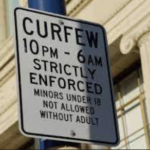Loitering Laws – What You Should Know
 Do You Have to Talk to a Police Officer?
Do You Have to Talk to a Police Officer?
You have the right to remain silent – except in a few specific circumstances
If you are walking down the street or just hanging out in a public place and a police officer approaches you and starts asking questions, do you have to answer? Lorenzo Banks is a criminal defense attorney and civil rights lawyer based in Oklahoma City, and Rob High is a retired sergeant from the Oklahoma City Police Department. Both are contributors to D.O.P.E. the Movement, and both say the answer is usually “no.” Most of the time you don’t have to engage with a police officer when you are in a public place and committing no crime – but there are a couple of key exceptions.
The Fourth Amendment of the Constitution protects individuals from unreasonable searches and seizures, and that includes being detained by police or being compelled to answer questions. While most interactions between law-abiding citizens and police officers are cordial, there are times when officers abuse their authority and violate an individual’s civil rights, and informed citizens need to know what their rights are and how to interact with law enforcement when they feel their rights are being violated.
Rob High says, “If I’m headed down the sidewalk and an officer comes over and says, ‘Hey, can I talk to you for a minute?’, I have a choice, and that’s ‘yes’ or ‘no.’ If he orders me to stop, I’m changing my approach and saying, ‘Am I not free to leave? Am I being detained?’” If an officer has no reasonable suspicion or probable cause of an imminent crime, the Constitution says they have to let you walk away. However, if an officer reasonably suspects that a citizen is committing or is about to commit a crime, they can detain them to gather more information or to ask questions. This is often referred to as a “Terry Stop,” in reference to the Supreme Court case of Terry v. State of Ohio.
While an officer has the right to briefly detain a citizen if they have a reasonable suspicion of a crime, the officer has no obligation to articulate that suspicion to the individual being detained. It’s a difficult moment for a citizen because they aren’t in a position to understand whether their rights are being violated or not. Lorenzo Banks says this is not the time to argue with an officer because the confrontation could escalate. “We can’t fight that battle on the sidewalk with the officer,” Lorenzo says, “we handle it on the back end after the fact.” Rob High agrees. If an officer indicates that you’re being detained or you’re under arrest, then you should cooperate with the officer, but Rob reminds us that a citizen being detained or arrested does not usually have to answer questions.
In the Terry case, the Supreme Court wrote, “the person stopped is not obliged to answer, answers may not be compelled, and refusal to answer furnishes no basis for arrest.” Anyone who has seen a police procedural on television is familiar with Miranda rights, most notably the right to remain silent. What many people don’t realize is that an officer must only inform an individual of their Miranda rights when someone is being arrested, but not necessarily when they’re being detained. The Terry ruling also says: “There is nothing in the Constitution which prevents a policeman from addressing questions to anyone on the streets,” but Rob High says that people often feel an obligation to answer questions and will volunteer information even though they’re not legally required to do so. His advice for citizens being questioned, detained, or arrested by police officers is to politely refuse to answer questions.
There are, however, some circumstances where a detained citizen needs to have a little more interaction with a police officer. Many states have “stop and identify” statutes that authorize police to require an individual to identify themselves when that officer has reasonable suspicion of a crime. “Stop and identify” statutes vary from state to state, and informed citizens should research whether “stop and identify” laws are in effect where they live.
Loitering laws present another scenario where a citizen may be compelled to engage with a police officer. A little more than half a century ago many states and municipalities had broad “vagrancy” laws that gave police the power to detain and arrest “rogues and vagabonds,” “common nightwalkers,” “habitual loafers,” and other people who fit other vaguely nefarious descriptions. Attorney Lorenzo Banks says, “Frankly, I believe these statutes were created for the purpose of violating people’s civil rights.” As The New York Times reported, “The laws proved handy to the police … as a means of arresting ‘undesirable” persons … reformers complained they were being enforced unfairly against minorities and youths.”
In 1972, the Supreme Court struck down a Florida vagrancy law in the case of Papachristou v. City of Jacksonville. Justices unanimously decried the law as “unconstitutionally vague” stating that “it encourages arbitrary and erratic arrests and convictions, it makes criminal activities that, by modern standards, are normally innocent, and it places almost unfettered discretion in the hands of the police.” The ruling forced states and municipalities across the county to update their loitering laws. Many of the new laws allow officers to question citizens “under circumstances that warrant a justifiable and reasonable alarm or immediate concern for the safety of persons or property in the vicinity.” These are often referred to as “loitering plus” laws – loitering plus the suspicion of some other criminal activity.
The concept of “reasonable alarm” mentioned in some of these “loitering plus” laws allows officers to question an individual about why they are occupying a public place. The citizen, who would otherwise be permitted to remain silent, then has the onus to provide a plausible, noncriminal reason to “dispel the alarm” or otherwise face possible arrest for violation of the local loitering statute. Attorney Lorenzo Banks says, “The fact that I have to go through this extra step to me is unconscionable when in other instances I can just say, ‘Officer, am I free to leave?’” Moreover, an individual who flees an officer during a loitering stop, attempts to conceal themselves, or refuses to identify themselves has not only failed to dispel the alarm, according to many statutes, but has actually confirmed the alarm, giving officers probable cause to make an arrest.
The Fourth Amendment’s prohibition against unreasonable searches and seizures means that citizens do not have to engage in voluntary interactions with law enforcement officers; however, the informed citizen knows that, depending on local laws, officers who have reasonable suspicion that a crime has been, is being, or is about to be committed can detain individuals, and in a few specific circumstances, they can legally compel an individual to identify themselves or explain why they are occupying a certain public space. In these circumstances, Attorney Lorenzo Banks recommends cooperating but keeping your answers as concise as possible. Rob High says an individual can always ask, “Am I free to leave?” at any point during a police encounter, and in the case of a loitering stop, that answer may very well change from “no” to “yes” when they adequately “dispel the alarm.”
It can be difficult for informed citizens to know when their rights are being violated because officers do not have to articulate their “reasonable suspicion” to the individual being detained. The good news is that in the case of an arrest, the officer will have to articulate their suspicion to a judge to make any subsequent charges stick, and a citizen can challenge an officer who violates their civil rights by filing a complaint after the fact. When it comes to De-escalating Officer Patrol Encounters, it is important for informed citizens to understand their rights, but it is also essential to understand that arguing about your rights with an officer during an encounter is generally counter-productive and could lead to disastrous results. The best thing to do, attorney Lorenzo Banks says, is to cooperate with the officer, articulate that you feel your rights are being violated, say no more than what your local laws require, and reserve your right to take appropriate action against the officer after you have endured the encounter.
 SHAWN VINCENT – LITIGATION CONSULTANT
SHAWN VINCENT – LITIGATION CONSULTANT
Shawn Vincent is a litigation consultant who helps select
juries in self-defense cases, and he manages public interest
of high-profile legal matters. If you have any questions for
Shawn, or would like topic specific articles, please send your
request to dopethemovementinfo@gmail.com attention Shawn Vincent Articles
Leave a Comment
You must be logged in to post a comment.
